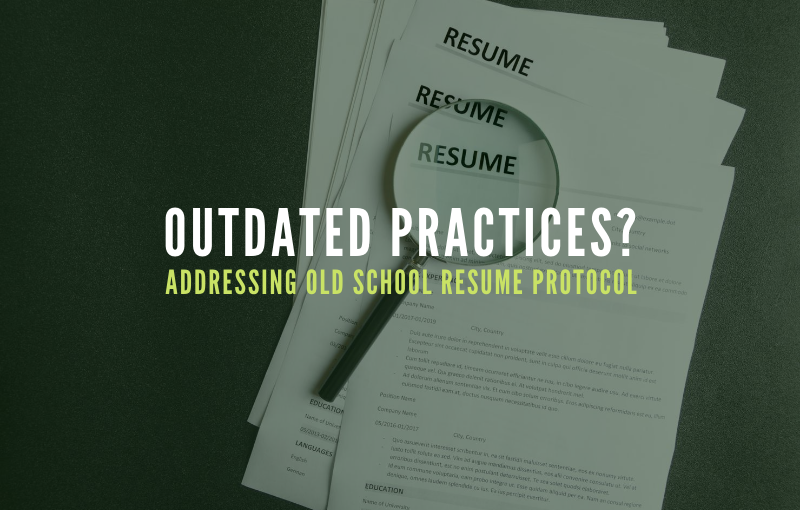Addressing Old School Resume Protocol
I read a lot. I enjoy mysteries, but I also read for work: to stay on top of trends in talent acquisition, to discover new technologies in Sourcing. And, I read to be informed on recruitment marketing drifts.
The talent acquisition profession had years of sluggish growth that has been replaced with technological systems and workflows. Recruiting uses software in the form of ATS, CRM, referral and reference software, as well as advances in artificial intelligence candidate matching tech and chatbots.
Coupling old school recruiting process with new technology means talent professionals now will be required to update as fast as the software changes. Therefore, shouldn’t our modus operandi in recruiting change too?
Why are we holding on to resume etiquette and other outdated practices? I’m willing to argue some of these practices be put to bed.
Is a good resume only two pages long?
Sigh. I’m working on my doctorate. In my early days of the program, I pestered my advisor daily for advice on the proper length of a doctoral dissertation. Surely someone somewhere could give me an average measurement. One hundred pages? Three hundred pages?
The answer I always received was “it takes as long as it takes”. That is the advice we should be giving candidates who ask the question of resume length. Noting a resume should be two pages was just an arbitrary number that stuck. I don’t care if its only half a page resume for a new graduate or a twelve-page cv for a research scientist with publications.
It takes as long as it takes.
Adding References to a Resume
“References Upon Request”. We can stop typing this at the end of a resume. There is technology for reference checking now. Not that I don’t like adding your references to my CRM and calling on them for jobs of my own later, because I will. It is just no longer necessary.
An ATS or reference checking software will ask candidates this information at the appropriate time. However, as an industry, we need to be better about practices that do not benefit the candidate. References on the resume is one practice that no longer aids the candidate. It exploits the references for unscrupulous recruiters to leverage.
Work Authorization
Add it. I’m all for helping a candidate note their authorization to work in the US if they are getting declined too often from recruiters due to visa assumptions. We need to do better at recognizing our own unconscious bias to candidates with names or locations that lean to foreign national status.
Until then, the candidate needs to fend for themselves and do what is necessary.
Address
I really do need to know where you live as a Recruiter or Sourcer. This is tied to relocation and geographic searches. But I’m fine if you want to leave off your street address, just the city and state is now acceptable. We aren’t mailing decline letters anymore via snail mail, so removing that information is now standard.
We still need email and phone number, but a candidate need not announce it. I know anything with an @ symbol is an email address.
Colorful, Graphic-Heavy Resumes
Go for it. Decorate that resume to your heart’s content. We don’t scan resumes anymore. Years ago, the scanning software was the reason behind plain resume text and fonts. The scanners couldn’t pick up details and decorations in a resume to be stored accurately. The sophistication just was not there.
Today, a modern ATS can upload any kind of document. Imaginative resumes are not just for graphic designers and creative roles anymore.
You go, buddy, you do you. Job descriptions are now becoming graphic. Resumes will not be far behind.
Objectives
Objectives are necessary should you be switching careers or just starting out. There is no reason to have an objective if you are full on into your career where the trajectory is obvious. If after thirty years in talent acquisition you want to switch to working in social services, then absolutely add an objective.
If your objective reads as an inane cliché to what you think people want to hear, then you have permission to delete it altogether. Ask yourself, is this objective a value add?
I am not advocating that we throw resume decorum in the trash. I still believe in formality, procedure, and rituals. 2020 has been a hard year, and I have seen humans act in self-regarding ways.
Modern thinking and change should not be filed away as venal and privy to shortcuts. Change is about accepting different thoughts, ideas, and actions that make our lives more fulfilling and less stressful. Let us not be overly aggressive into ideals that have run their course.
It is a new day for candidates, and we need to come along for the ride.
Authors
Christine Hampton
Christine is a Doctor of Business Administration candidate researching talent sourcing strategies in healthcare. This is Christine's 29th year in Talent Acquisition, with the last 9 years focusing on sourcing and recruitment marketing.
Recruit Smarter
Weekly news and industry insights delivered straight to your inbox.







